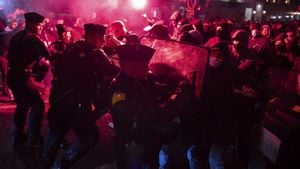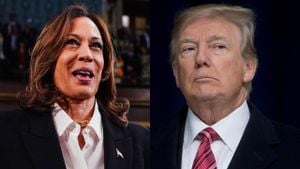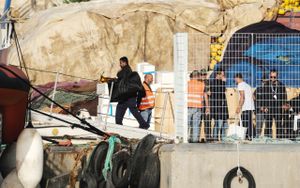With tensions at boiling point across the Middle East, the recent return of former President Donald Trump to the political scene has sent ripples through diplomatic relations, particularly concerning Iran. These developments have placed considerable pressure on leaders from across the region, who are grappling with the consequences of Trump's possible re-engagement with the nuclear deal and his hardline stance against Tehran.
The Israel Defense Forces (IDF) remain heavily involved on the ground, continuing aggressive airstrikes not only against Hamas targets but also at locations linked to Iranian influence throughout Gaza, Lebanon, and, more recently, parts of Syria. Since Trump’s election, Israel has heightened its military activity, anticipating Iran might retaliate before the new administration can enforce its policies.
Several sources indicate deep-seated concerns within Israel’s defense establishment. Israeli intelligence stakeholders have ramped up coordination with U.S. military forces, particularly CENTCOM, to share surveillance and situational assessments. Senior IDF officials are determined to monitor Iran's strategic maneuvers closely, especially as the country amplifies its rhetoric and military posturing. Many analysts believe diplomatic efforts to restrict Iran's nuclear ambitions have reached their limits.
Israeli Prime Minister Benjamin Netanyahu’s comments reflect this urgency. He recently noted his alignment with Trump’s approach to Iran, expressing confidence they both see eye to eye on the need for stricter measures against Tehran. For him, this is not merely speculation; Netanyahu has made strategic moves to fortify Israel's military and political alliances, leveraging support from the Pentagon and allied nations.
Meanwhile, the political atmosphere within Iran has its own set of complications. Abolfazl Fateh, formerly of the Iranian Students News Agency, remarked on the need for Tehran to strategize effectively after Trump's victory, cautioning against being caught flat-footed by any potential U.S. aggression. His commentary, which appeared on state media, suggests Iran may need to prepare for more confrontational approaches from the West.
Iran's leadership is reportedly not put off by Trump's past policies, rather they interpret his return as prompting the need for more severe diplomatic maneuvers, including the possibility of making concessions to international norms. Yet, as tensions between Israel and Iran escalate, analysts like Ali Ahangar have suggested Iran remains committed to building constructive relations with more moderate elements within its government.
Parallel to these developments, Saudi Arabia's Crown Prince Mohammed bin Salman (MBS) recently addressed the need for Iran's sovereignty to be respected at a major summit held to address fighting particularly between Israel and Hezbollah-backed militants. His comments mark what some see as a significant pivot away from Saudi Arabia's previously pro-Israel stance and instead, advocates for Iranian rights.
During the summit, MBS highlighted the senseless violence affecting Palestinians and the need for regional actors to find mutual respect rather than continue cycles of violence. His pointing finger at Israel for committing genocide garnered attention, especially considering Riyadh's earlier overtures toward establishing normalized relations with the Jewish state. This indicates Saudi Arabia might be recalibrated its position following the recent military escalations stemming from Gaza.
He’s joined by leaders from across the Arab League and the Organization of Islamic Cooperation (OIC), who voiced similar sentiments, urging international cooperation against Israeli aggressions. There’s palpable tension swirling around Jerusalem, as regional powers reassess alliances against the backdrop of Trump's return to power.
The rising violence has sparked fears among Israeli defense officials, who are alerting their U.S. counterparts to the potential for Iran to launch aggressive maneuvers as Israel navigates between aerial assaults and its neighbours. The IDF has successfully carried out strikes on numerous Iranian military installations, aiming to disrupt their operation capabilities significantly.
Before this year, Saudi Arabia had been inching closer to formal ties with Israel, driven by mutual concerns over Iran's regional ambitions. The recent re-escalation could stifle such aspirations, as MBS seems to pivot back toward affirming regional unity against what is perceived as encroachment from Israel.
For many Iranian officials, Trump’s election is not merely about U.S. foreign policy; it stands as a barometer of their strategy moving forward. Analysts posit the prospect of negotiations under the potential next administration will depend heavily on the political climate within Iran and its leaders' willingness to engage with the incoming U.S. government.
Iran continues to enrich uranium, though its levels remain beneath the 90% enrichment threshold required for bomb material. Recent Israeli strikes have resulted in some weakening of Iran's production capabilities, leaving it vulnerable to aerial attacks. Defense analysts expect to see Iran bolster its presence across the region, seeking to fortify its influence through proxies and establish new military alliances.
The IDF has consistently monitored these developments and has ramped up preparations for rapid response as tensions rise. With Trump's assertive posture expected on the international stage, the Middle East finds itself spiraling toward heightened military readiness on both sides.
Trump's approach will be carefully watched; as he may signal aggressive action against Iran could resume, reminiscent of his previous administration when numerous sanctions were enforced. Fortunately or unfortunately (depending on one’s perspective), Trump has consistently stated, “Iran will not have nuclear weapons,” but his proposed policies remain vague. The implications of his renewed presidency could lead Israel to either support or deflect from military action against Iranian positions.
For Netanyahu and his administration, aligning closely with Trump may prove strategically advantageous, but it requires balancing risks of militaristic overreach against diplomatic engagements. Meanwhile, with the re-kindling of Iran's relations with Saudi Arabia, the geopolitical chess match could grow even more complex.
What all of this spells for the future remains unclear, as leaders navigate this shifting political terrain, each action leads to regional ramifications impacting alliances and hostilities across the Middle East. Will diplomacy take the steering wheel, or are we barreling toward another phase of turmoil?



